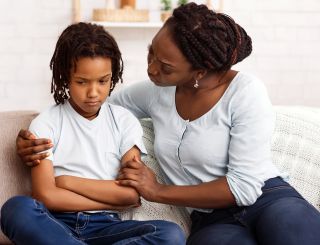Parenting
Navigating Parent-Child Conflict
The art of reconnection and repair.
Updated November 6, 2023 Reviewed by Monica Vilhauer Ph.D.
Key points
- Conflict in the parent-child relationship is inevitable; it is not a sign of poor parenting.
- Developmental experts note that conflicts and disruptions are normal and necessary for learning and growth.
- Relational repair is needed if family members are holding grudges, feeling rejected, or becoming alienated.
- If parents handle conflict with patience and hope, children learn about the ebb and flow of relationships.
By Kat Scherer, PhD

Human development experts tell us that conflicts and disruptions between parents and children are natural and necessary for learning and personal growth. These family tensions might include arguments, misunderstandings, or moments of disengagement. Some disconnections and reconnections are minor or playful, while others may require adult assistance to comfort the child or rebuild trust.
Even childhood games involve some amount of frustration and conflict, usually resulting in reconnection and repair. In simple games like peek-a-boo with a baby, a brief disconnection is swiftly followed by resolution; minor frustration is resolved by the parent. As children grow, they engage in more complex versions of conflict and recovery with games such as tag or hide and seek.
Children's emotional development depends on experiencing and working through these conflicts and disconnections. Parents can monitor their children's stress reactions and recovery process. It's not healthy or helpful if distress goes beyond their abilities to cope and recover. Major conflicts or disconnections may require adult assistance to resolve.
Renowned child psychologist Ed Tronick, PhD, underscores that a healthy process of conflict and resolution is vital for children to develop social and emotional skills. A successful reconnection and repair process after conflict or disconnection teaches children that mistakes are normal and can be resolved. People are not defined by their errors. The cycle of discord, reconnection, and repair promotes growth and resilience.
1. Prepare for Parent-Child Disruptions
Parents should recognize that humans are complex and relationships can be messy. It is critical to understand that parents aren’t perfect and can’t always align with their children. Preparing for conflicting needs and different preferences is part of life. Conflict in the parent-child relationship is unavoidable and doesn’t indicate poor parenting. Parents can assist in the repair process by offering support and guidance.
Relationship conflicts or ruptures can be emotionally charged for both children and parents and might result in the inability to regulate feelings. When tensions rise, tempers may flare, and someone might storm off in anger, causing hurt or frustration. However, these moments also present valuable opportunities for learning and growth. When parents facilitate a positive repair process, they teach their children how to self-soothe and reconnect in relationships.
This doesn't mean parents should overly focus on each minor disagreement or temporary disconnection, such as a child's reaction after their parent sets a limit. The regular ups and downs of the parent-child relationship do not benefit from constant attention, especially when a child is capable of self-soothing and quickly bouncing back to connection or play. Sometimes, it is okay to let it go and move on to the next positive connection.
2. Emotional Soothing After Disruption
When significant family disruptions occur, the first step is for parents to calm themselves before addressing any issues. Once adults have regained emotional stability, they can provide a safe and secure place for children to manage their big feelings. Calm and regulated parents offer comfort and serve as role models for emotional regulation after conflicts.
Achieving emotional stability involves allowing each family member time and space to settle themselves so they're ready to resume interactions. The time needed varies. Once parents are composed and grounded, they can either reinforce children's self-soothing or provide co-soothing alongside the child. During this soothing process, parents should not focus on mistakes or assign blame.
Soothing children involves parents managing their own feelings and shifting their focus to meet their children’s emotional needs. Parental attunement helps children better understand and accept their emotions and fosters self-compassion. This nurturing process strengthens the parent-child relationship, and children feel valued and loved.
3. Parents Guide Reconnection and Repair
Once children are emotionally stable and ready for reconnection, parents can work on the reuniting and repair process. Adults are stronger and more mature than children, so they should lead the recovery process with their reassurance and hope.
Relational repair is typically needed when children or parents are holding grudges, feeling rejected, or becoming alienated from one another. It might be as simple as a return to positive exchanges, such as caring words or actions. Or, it might involve physical hugs or playfulness.
Some repairs might be facilitated by an apology or an offer to fix a wrong, but such amends are not required for repair. It is important to note that children can feel shame and insecurity after mistakes. While awareness of errors is okay, dwelling on them is not productive.
The intentional steps toward reuniting and repair are crucial. After discord, if parents do not create opportunities for hopeful reconnection and recovery, it can leave children feeling rejected and alone. Children might judge themselves negatively. And, parents have missed an opportunity to build their trust and confidence in relationships.
If parents handle relational disruptions optimistically and patiently, children learn about the ebb and flow of relationships. This aids children in learning to navigate the complex social cycle of struggle and recovery. When parents support the return to positive connection, children can feel safe and hopeful. They learn that recovery is available, natural, and expected.
4. And, the Cycle Repeats
Struggles in family life are inescapable. And children learn through watching their parents deal with them. How do their parents resolve conflicts? How do other family members work through disagreements? If adults demonstrate a commitment to resolution in all their relationships, they teach the value and the skills to navigate social tensions and find solutions.
The cycle will repeat, over and over: relational errors, dysregulation, emotional calming, repair and forgiveness. And children learn. This intentional parenting is not an easy journey, and parents will certainly falter at times. No caregiver is perfect. But adults who pursue this course leave an important legacy. They lay the foundation for their children's happiness and social success.
References
Sylvester, E. & Scherer, K. (2022) Relationship-Based Treatment of Children and Their Parents: An integrative guide to neurobiology, attachment, regulation, and discipline. WW Norton.
Tronick, E. & Gold, C. (2020) The Power of Discord: Why the ups and downs of relationships are the secret to building intimacy, resilience, and trust. Scribe Publications.




